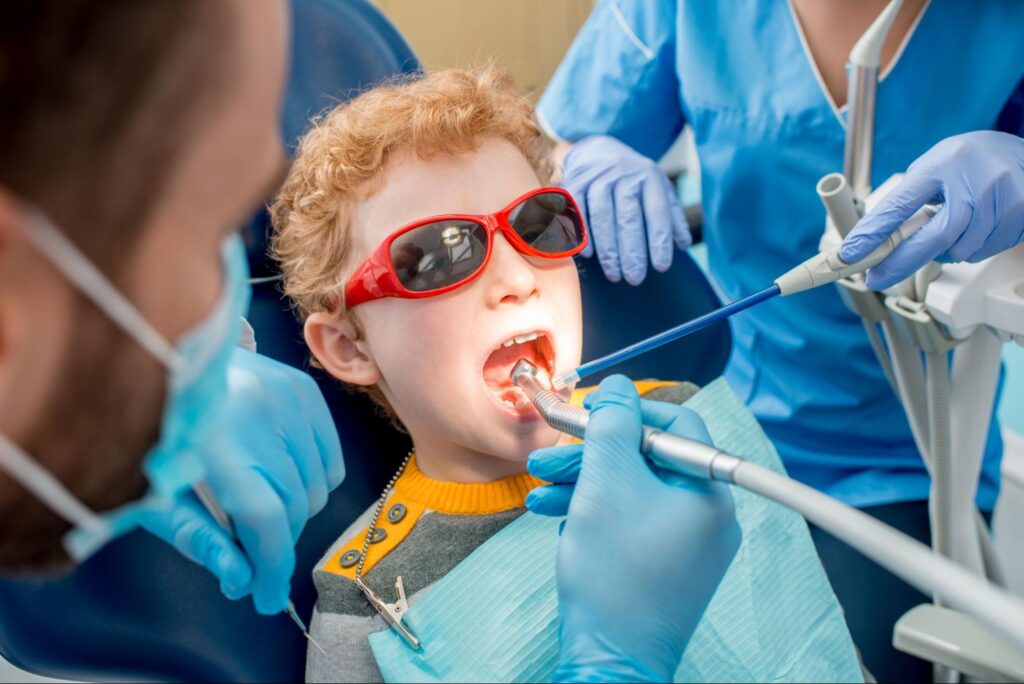When you’re a parent, you get used to being the first responder. Whether your kid falls off a scooter, bites into something too hard, or wakes up in pain, it’s on you to figure out what’s serious and what can wait. Dental accidents aren’t always straightforward. That’s where knowing when to call the pediatric dentist makes all the difference.
Dr. Scott (our pediatric dentist) and Dr. Matt (our orthodontist) at Southwest Pediatric Dentistry & Orthodontics help families handle dental emergencies in Littleton with clear next steps so there is little to no panic required.
What Counts as a Dental Emergency
Some things can wait until your child’s next cleaning. Others need same-day attention. If you’re unsure, here’s a quick way to tell the difference:
Pain That Doesn’t Go Away
A little sensitivity after eating ice cream? This is normal. A throbbing pain that keeps your child up at night? Call us immediately. Persistent pain is often a sign of infection, a deep cavity, or an injury to the nerve. None of those should be left alone.
A Tooth Gets Knocked Out
If a permanent tooth gets knocked out, it’s go-time. Gently rinse the tooth (don’t scrub it) and try to place it back in the socket if you can. If not, tuck it into a container of milk or saliva and call us immediately. Timing matters here, and ideally, we want to see you within 30 minutes.
Baby teeth are different. Don’t try to put one back in. Still call the office, but there’s usually no rush if your child isn’t in pain.
A Tooth Chips or Breaks
This happens more often than you think, especially in active kids. If it’s a small chip and there’s no pain, we’ll want to look at it soon, but it’s not an emergency. If a larger chunk is missing or your child is uncomfortable, it’s time to call.
How to Handle Accidents in the Moment
Accidents don’t wait for convenient times. Whether it’s during dinner, practice, or bedtime, knowing what to do can make everything easier. Start here:
- Stay calm. Your reaction sets the tone.
- Rinse your child’s mouth with warm (not hot) water.
- Use a cold compress to help with swelling or bruising.
- If there’s bleeding, apply gentle pressure with gauze or a clean cloth.
- Save any tooth pieces you can find in a small bag or container.
Call us and let us know what happened. We will help you decide what to do next. The goal isn’t to fix everything yourself. It’s to keep your child stable and comfortable until we can take a look.
Common Scenarios and What to Do
Some dental issues are obvious, and others sneak up on you. Either way, knowing what you’re looking at can help you stay calm and take the right next step. Here’s a breakdown of the most common situations we see and what to do when they happen.
Knocked-Out Tooth
If it’s permanent:
Try to gently place it back in the socket or store it in milk or saliva. See us ASAP.
If it’s a baby tooth:
Do not reinsert it. Call us for guidance.
Loose Tooth from Trauma
Even if it’s a baby tooth, we want to take a look to make sure the surrounding teeth and gums weren’t affected. Loosening from normal development? This is totally fine. Loosening from a fall? Let’s check it.
Dental Abscess
A pimple-like bump on the gum, foul taste, swelling, or fever may point to an abscess. This needs quick treatment to avoid spreading the infection.
Toothache
Sometimes a toothbrush can’t reach everything. Food stuck between teeth can cause temporary discomfort. Try flossing gently and rinsing with warm water. If the pain continues or returns frequently, schedule an appointment.
Not Every Emergency Looks Dramatic
Some of the most serious issues don’t come from a visible injury. Swelling, color changes in a tooth after trauma, or subtle shifts in bite can all signal bigger problems. If your child recently bumped their mouth, even if everything looked fine at the time, it’s worth mentioning at their next visit or calling sooner if something seems off.
If your child is in braces or aligners? Accidents can still happen. Loose wires or brackets, lost aligners, or discomfort from trauma should be looked at, even if it doesn’t seem urgent.
What You Can Do to Prevent Future Issues
This isn’t about bubble-wrapping your child. A few small things can make a big difference.
- Get a mouthguard for sports, even casual ones like backyard basketball or scooters.
- Stick to regular dental checkups. Early detection can stop small issues from becoming emergencies.
- Teach your child not to use their teeth as tools. No opening packages or biting pencils.
- Watch hard or sticky snacks. Lollipops and popcorn kernels are common culprits.
- Encourage good brushing habits. A strong foundation keeps teeth more resilient.
- Kids will still be kids, but a little prevention goes a long way.
You’re Not in This Alone
Dental accidents are stressful, but they don’t have to send you into a tailspin. When something unexpected happens, your job is to keep your child calm and call the office. Our job is to handle the rest.
Dr. Scott and Dr. Matt are part of your team at Southwest Pediatric Dentistry & Orthodontics. You’ll see the same doctors and friendly faces each time you visit, which makes everything smoother, including emergencies. Whether it’s your first time calling or you’ve been coming here for years, we’ll talk you through the next steps in a way that makes sense.
We’ve also got some fun distractions in the office to help your child feel comfortable, like our fish tank and treasure chest (always a hit after tough visits). If you’re coming from across town, our easy parking doesn’t hurt either.

Call Southwest Pediatric Dentistry & Orthodontics
If your child has a dental emergency, or you’re not sure if it’s an emergency but want a second opinion, give us a call. We’d rather hear from you early than too late.
Dr. Scott and Dr. Matt are here at Southwest Pediatric Dentistry & Orthodontics to walk you through what to do in Littleton, offer real solutions, and make sure your child gets the care they need, without adding to your stress.
When something feels off, trust your gut and reach out. That’s what we’re here for.




